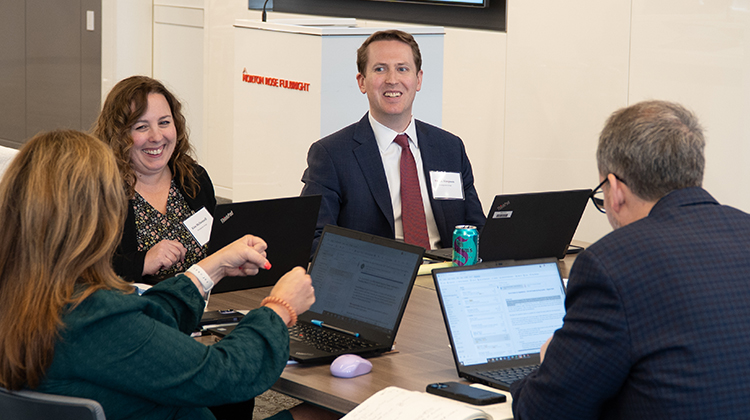This session offered a comprehensive review of some of the largest and most notable coverage cases from 2024. David Silvers, Complex Assumed Claims Analyst, RiverStone Group moderated the discussions led by representatives from AIRROC’s Corporate Partner firms. Panalist included J.D. Anders, Counsel, Chaffetz Lindsey, Kristen Kish, Partner, Mound Cotton Wollan Greengrass LLP, and Sarah Phillips, Counsel, Simpson Thacher & Bartlett LLP.
The panel addressed pivotal Federal and state court cases that tackled several intriguing issues, with a few landmark cases that reached the Supreme Court that will have a profound significance on the runoff market and the broader insurance industry.
The first topic discussed was arbitrability – who decides if a dispute is subject to arbitration. The U.S. Supreme Court in Coinbase, Inc. v. Suski dealt with the issue of multiple agreements with conflicting delegation clauses. In an unanimous decision, the Court held that when one contract provides for an arbitrator to decide whether the dispute is subject to arbitration, and another, later, contract has a forum selection clause specifying a particular court to decide, it is up to a court, not an arbitrator, to determine whether the arbitration clause in the first contract applies. There must be clear and unmistakable evidence of an agreement to delegate the question of arbitrability to an arbitrator.
The second Supreme Court decision discussed was Smith v. Spizzirri in which the Court resolved a split among the circuits as to whether a district court must dismiss or stay actions subject to arbitration under of the FAA. Relying on the language of 9 U.S.C. § 3 which states that when a dispute is subject to arbitration, the court “shall on application of one of the parties stay the trial of the action until [the] arbitration” has concluded. The Supreme Court held that “shall” is mandatory and that courts do not have discretion to dismiss actions subject to arbitration under the FAA but rather must issue a stay. The Court also noted that orders denying arbitration are immediately appealable, while orders allowing arbitration are not, consistent with FAA’s pro-arbitration policy.
The panel next discussed recent case law on Pollution Exclusion issues in the context of Construction Defect and First-Party Property cases. Some of the topics addressed in theses decisions included:
-
- What makes a substance a ‘contaminant’ – and thus a ‘pollutant’.
- What constitutes a “claim for damages”.
- Whether a Containment or Pollutants Exclusion precluded coverage for BI losses alleged as a result of the Covid-19 shutdown.
- Whether soot and ash damages from a wildfire constitute “direct physical loss to property” under a homeowners’ policy.
Finally, the panel discussed the unanimous Supreme Court decision in Truck Insurance Exchange v. Kaiser Gypsum, 602 U.S. 268 (2024) which held that an insurer with financial responsibility for a bankruptcy claim is a “party in interest” to the bankruptcy proceeding. The Court rejected the application of the insurance neutrality doctrine finding that the insurer had standing to object to a plan of reorganization. The panel ended with a brief discussion on the backlog of insurance coverage cases dealing with Covid-19. There are still more in the pipeline but as the case law develops some are be decided on summary judgment. The decisions continue to be favorable to insurers.
A video replay of this presentation can be accessed in the AIRROC On Demand Library at https://airroc.memberclicks.net/airroc-on-demand.
